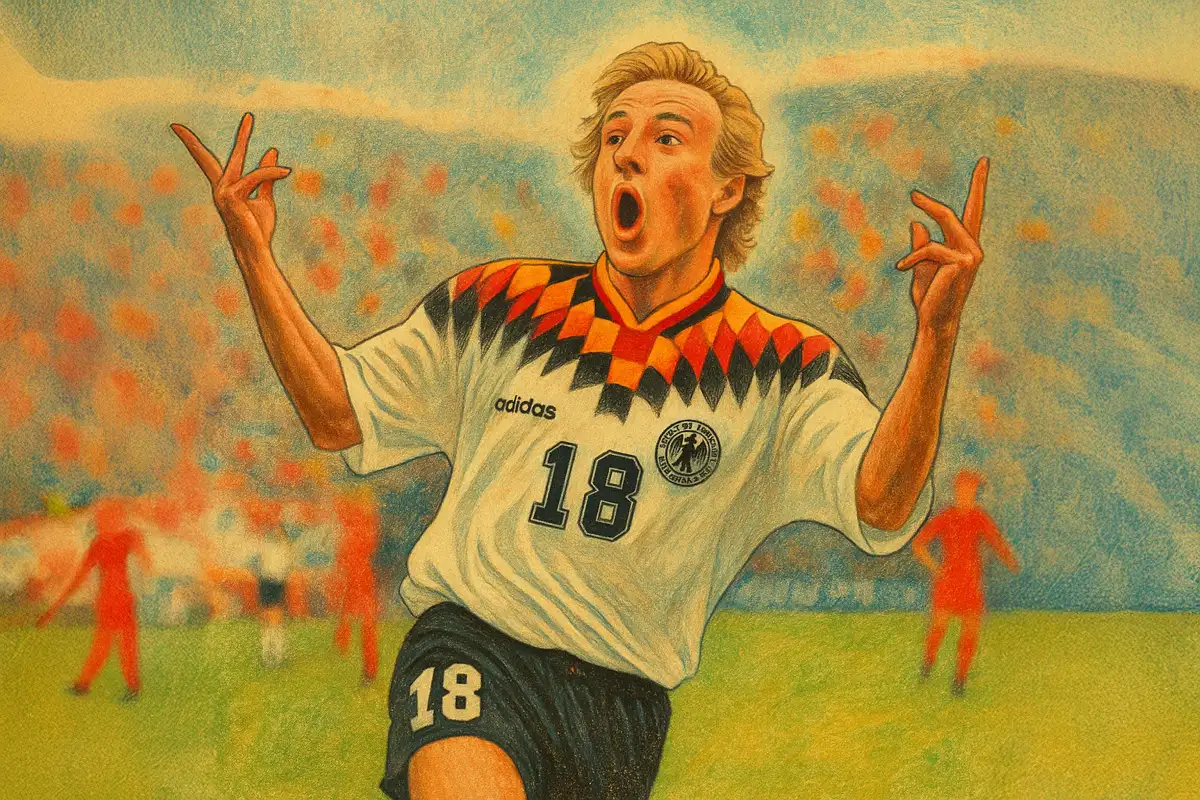
I always wondered: how was Monaco able to sign a top-class striker like Jürgen Klinsmann to replace another incredible striker that was George Weah? So I decided to find out, as I analyzed the career of this incredible German striker.
What I found was that there are players whose careers are told through goals and trophies, and others whose stories are layered with moments of charm, chance, and contradiction. Jürgen Klinsmann was all of the above. A World Cup winner, a Bundesliga hero, a Premier League darling, and for one curious spell in France, a star seduced by a promise never meant to be kept.
That promise? That he would play alongside George Weah at AS Monaco. The man who whispered it? A young Arsène Wenger. And the very next day, Weah was sold to Paris Saint-Germain.
This is the story of Klinsmann’s journey—the goals, the partnerships, the triumphs—and how a calculated lie brought him to the shores of the Mediterranean.
The Making of a Goalscorer
Born on July 30, 1964, in Göppingen, West Germany, Jürgen Klinsmann grew up in a family of bakers. By 16, he was already scoring goals at youth level, and by 17 he signed his first professional contract with second-tier club Stuttgarter Kickers. Three seasons, 61 matches, and 22 goals later, 20-year-old Klinsmann moved across town to VfB Stuttgart in the Bundesliga. There, he exploded.
Between 1984 and 1989, Klinsmann scored 79 goals in 156 appearances. He finished as Bundesliga top scorer in 1987–88 and helped Stuttgart reach the UEFA Cup final in 1989. They narrowly missed out on the title, losing 4-5 on aggregate against Maradona’s Napoli. This was a Stuttgart team led by Dutchman Arie Haan, and with a handful of international stars such as keeper Eike Immel, defender Guido Buchwald, Maurizio Gaudino and Srečko Katanec.
That summer, he joined Inter Milan for around 15 million Deutsche Marks.
The German Invasion at Inter
Inter were rebuilding, and Klinsmann was brought in to replace Argentine striker Ramón Díaz and play alongside ageing Aldo Serena. He joined fellow Germans Lothar Matthäus and Andreas Brehme, forming a Teutonic trio that brought order, discipline, and quality to the Nerazzurri. The German trio quickly became the backbone of a team determined to rival Arrigo Sacchi’s Milan and their own trio—the Dutch stars Van Basten, Gullit and Rijkaard.
Under Giovanni Trapattoni, Inter had just won the 1988–89 Serie A title. In Klinsmann’s debut season, they added the 1989 Supercoppa Italiana. Though they couldn’t repeat domestic success due to the dominance of Milan, Klinsmann scored 34 goals in 95 Serie A matches and provided tireless movement, pressing, and finishing ability.
His highlight in Italy was the 1991 UEFA Cup win, in an all-Italian final against Roma, whose attacking star was his fellow countryman and partner in crime in Germany’s attack—Rudi Völler. Inter won 2-1 on aggregate and lifted the trophy.
But despite his consistency, Klinsmann began to tire of the ultra-defensive style in Italy and the rigid media narratives. Sacchi’s Milan reigned supreme, and Inter’s decline in the early 1990s left him seeking a fresh challenge.
Nevertheless, during his three seasons in Italy, he became the main element in West Germany’s attack.
“
1990 FIFA World Cup in Italy. Klinsmann, paired with Völler, formed a lethal attack under Franz Beckenbauer. With Andreas Möller, Thomas Hässler, Matthäus and Pierre Littbarski providing support.
The International Stage: From Bronze to Gold
Klinsmann was more than a club striker. He made his international debut in 1987 and was immediately integrated into a talented West Germany squad.
At Euro 1988, hosted by West Germany, Klinsmann played alongside Rudi Völler and Lothar Matthäus. The team reached the semi-finals but were eliminated by the Netherlands, much to the disappointment of an entire nation. The Netherlands, led by AC Milan’s trio Van Basten, Gullit and Rijkaard, would end up winning the final 2-0 against the USSR. Gullit’s header in the first half and what some call the best goal ever—that mythical no-angle Van Basten strike that surprised Rinat Dasaev—secured the title.
That same summer, he helped West Germany win a bronze medal at the 1988 Seoul Olympic Games.
Then came the peak: the 1990 FIFA World Cup in Italy. Klinsmann, paired with Völler, formed a lethal attack under Franz Beckenbauer. With Andreas Möller, Thomas Hässler, Matthäus and Pierre Littbarski providing support, Germany powered through. Klinsmann scored three goals and was instrumental in stretching defences. Germany defeated Argentina 1–0 in the final. Klinsmann suffered the penalty that Andreas Brehme would convert and saw Argentine defender Pedro Monzón subsequently sent off. He was criticized for diving, a claim he denied. Klinsmann was now a world champion.
In Euro 1992, Klinsmann lost his first final as Germany (now unified) reached the final, losing shockingly to Peter Schmeichel’s and Brian Laudrup’s Denmark in one of the most unexpected results to date. He again played a central role, scoring three goals in the competition. By now, he was one of the most recognisable strikers in Europe.
Wenger's Whisper in the Wind
So, how did AS Monaco manage to sign one of Europe’s top strikers?
In the summer of 1992, Klinsmann was 28. He had just played in another major final. Yet he was disillusioned with Serie A. That’s when Arsène Wenger made his move.
Wenger, managing an ambitious Monaco side, offered him a fresh challenge, a beautiful setting, and the promise of forming a strike partnership with George Weah.
Klinsmann admired Weah deeply. The Liberian was raw, electric, impossible to predict. Their partnership could have been sensational. Wenger knew it. He told Klinsmann they would play together.
Klinsmann signed. The next day, Weah was sold to PSG.
“I had to lie,” Wenger later admitted. “But it was a good lie.”
Klinsmann was stunned and disappointed, but stayed. And played.
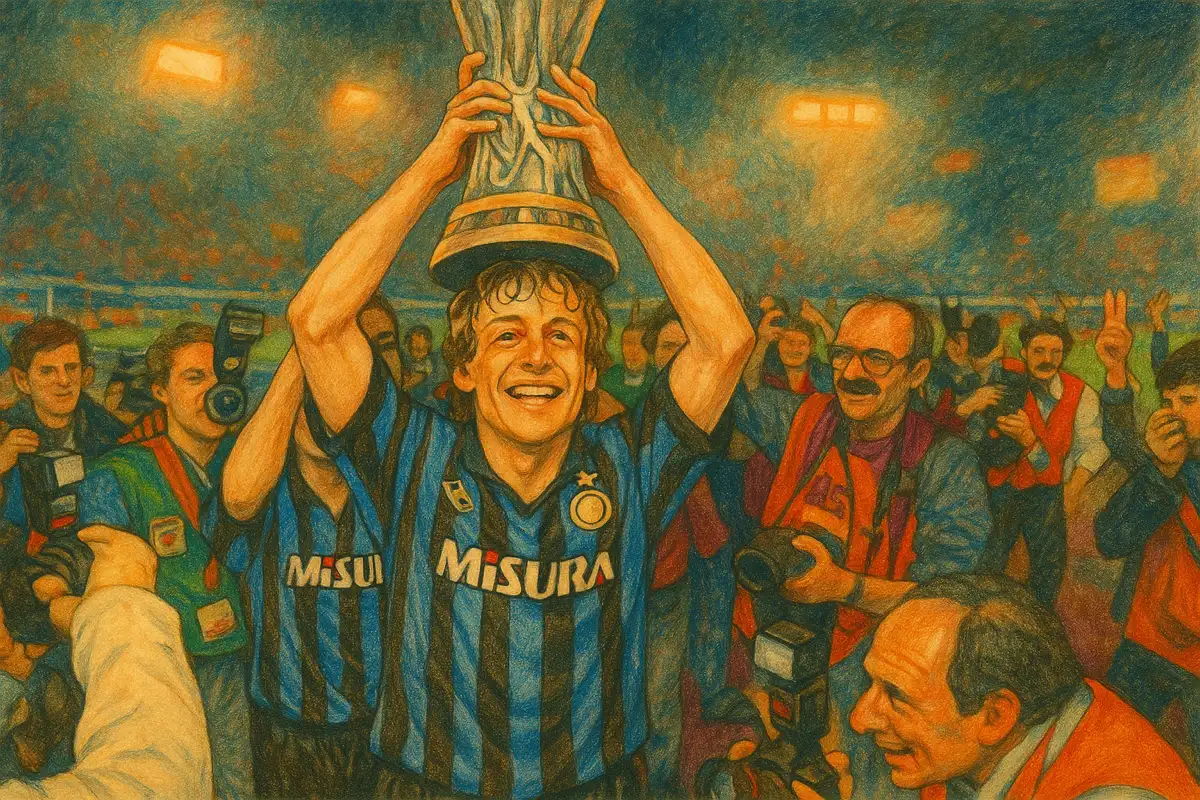
Monaco: Magic and Misunderstanding
Klinsmann joined a Monaco side rich in talent. The 43-year-old Wenger was a man ahead of his time, with a vast network of scouts that kept finding talent after talent. Rui Barros, the nimble Portuguese playmaker; Youri Djorkaeff, elegant and inventive; a young Emmanuel Petit; defender Lilian Thuram; and Claude Puel, the veteran leader.
In 1992–93, Klinsmann scored 20 goals in all competitions as Monaco finished third in Ligue 1, behind Bernard Tapie’s Olympique Marseille and Artur Jorge’s Paris Saint-Germain.
The following year, despite finishing 9th in the league, Monaco reached the UEFA Champions League semi-finals—a historic achievement. They were knocked out by AC Milan—now without the Dutch trio. The Italians went on to win the competition, defeating Cruyff’s Dream Team in the final, 4-0.
Klinsmann was central to that run, scoring in the group stage and providing leadership. In total, he scored 29 goals in 65 appearances for the club. He didn’t win a trophy in Monaco, but left a mark.
World Cup in America
By 1994, already 30 years old, Jürgen Klinsmann was Germany’s main attacking threat. So, as defending World Cup holders, hopes were high. After cruising through the group stage and knocking out Belgium in the Round of 16 (with two goals by Völler and one by Klinsmann), Germany was surprisingly eliminated by the revelation team of the tournament: Stoichkov’s Bulgaria.
On a sunny afternoon in a 72,000-packed Giants Stadium, Germany took the lead early in the second half through a Lothar Matthäus penalty and Rudi Völler saw the 2-0 disallowed. Then came the disaster. On the 75th minute, an incredible left-footed freekick by Hristo Stoichkov that left Bodo Illgner frozen. Just three minutes later, that iconic Yordan Letchkov header gave Bulgaria the lead and, probably, the most memorable game of the nation’s history.
Despite Germany’s early exit, Klinsmann’s exhibitions and goals (five goals in five games) left his reputation intact. And then came a surprise transfer, as he left Monaco to join the flourishing English Premier League.
Across the Channel: A New Kind of Hero
In 1994, Klinsmann joined Tottenham Hotspur for an estimated fee of £2 million. The English media, sceptical after Italia ’90 theatrics, branded him a diver. He responded by scoring on debut and celebrating with a self-aware dive.
Instantly, he won hearts. His exhibitions, goals and sense of humour made him one of the most popular footballers in the country. Over 150,000 shirts with his name were sold.
Alongside Teddy Sheringham, Darren Anderton, Ilie Dumitrescu and Nick Barmby, Klinsmann brought class and continental swagger to White Hart Lane. He scored 21 goals in 41 matches and was named Football Writers’ Player of the Year.
But after one season, he left for Bayern Munich and for a chance not only to finally win a league title, but to do so in his home country.
Bavarian Redemption
At Bayern, Klinsmann was clinical. In two seasons (1995–1997), he scored 31 goals in 65 Bundesliga matches. In 1996, he won the UEFA Cup, scoring 15 goals in the competition—a record at the time. That squad included Mehmet Scholl, Christian Ziege, Oliver Kahn, Jean-Pierre Papin, Lothar Matthäus and Thomas Helmer.
That same summer, with sweeper Matthäus injured, Klinsmann had the chance to captain Germany to Euro 1996 glory. Despite injury and only playing four of the six games, he was the team’s top scorer with three goals and lifted the trophy at Wembley after a golden goal from Oliver Bierhoff. Yet another title and another fundamental contribution to his team’s success.
The 1996-97 season would see him finally win a domestic league title, something that had eluded him throughout his entire career. Now aged 32, he was the most used player and top scorer of the team. Despite being one of the most influential players in the team, disagreements with club captain Lothar Matthäus would precipitate his departure from the club at the end of the season.
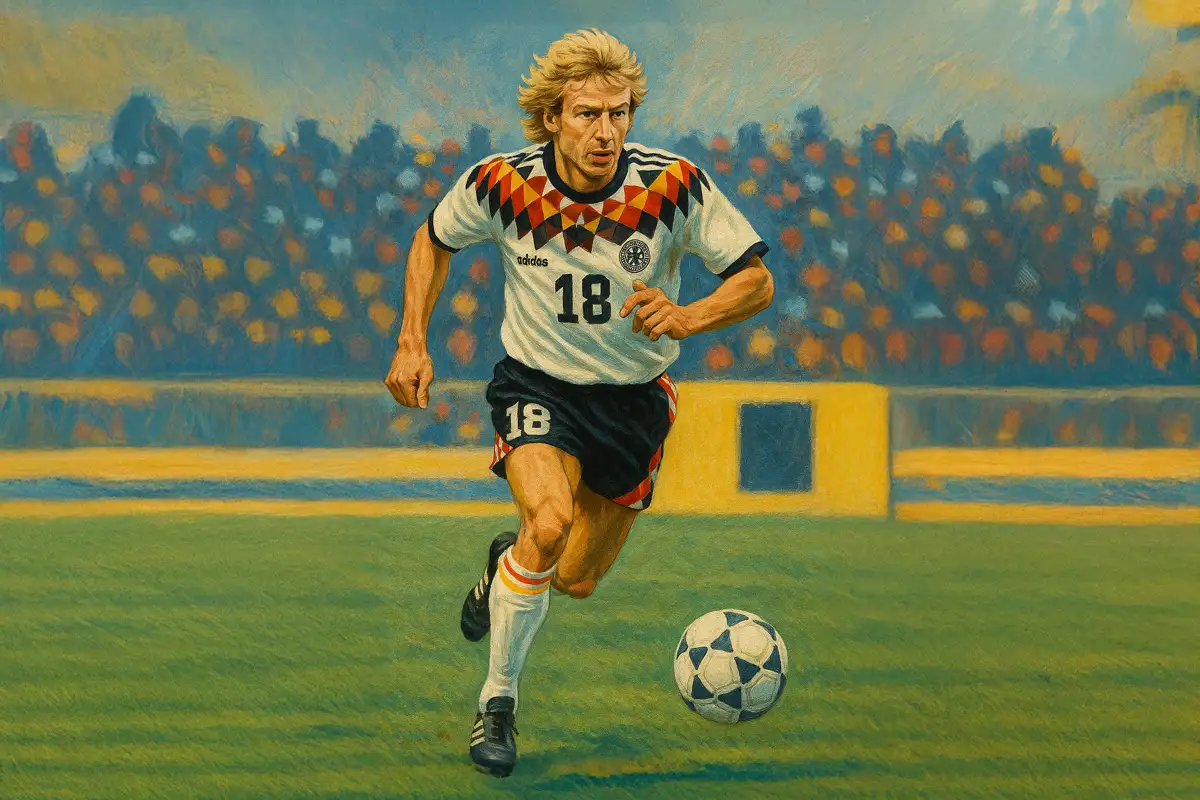
The Last Dance
After Bayern, Klinsmann moved to Sampdoria in 1997. But his time in Genoa was brief. Eight appearances, two goals. In January 1998, he returned to Spurs on loan.
There, he scored nine goals in 15 matches, including four in one iconic match against Wimbledon, helping Tottenham avoid relegation. It was a heroic goodbye.
He would retire on the biggest of stages: after the 1998 World Cup, where he played all of his team’s five games and was joint top goalscorer, alongside Oliver Bierhoff, with three goals. Just like four years earlier, in 1994, Germany would go out to the tournament’s surprise, now Davor Šuker’s Croatia. A 10-men Germany would suffer a 0-3 defeat in what would be Jürgen Klinsmann’s final professional game.
Legacy: The People's German
It might be a generational thing, but when I think about German strikers, the first name that comes to my mind is Jürgen Klinsmann. And, despite that, he wasn’t the stereotypical German footballer. He smiled. He joked. He spoke English fluently and embraced other cultures. He could lead with authority but played with joy.
He finished his career with:
- 108 caps and 47 goals for Germany
- Over 500 club matches and 227 goals
- A World Cup, a European Championship, a UEFA Cup and a Bundesliga
But, most of all, he finished his career an icon. He was the kind of striker you didn’t just admire. You liked him. You wanted him to score. You wanted him to win.
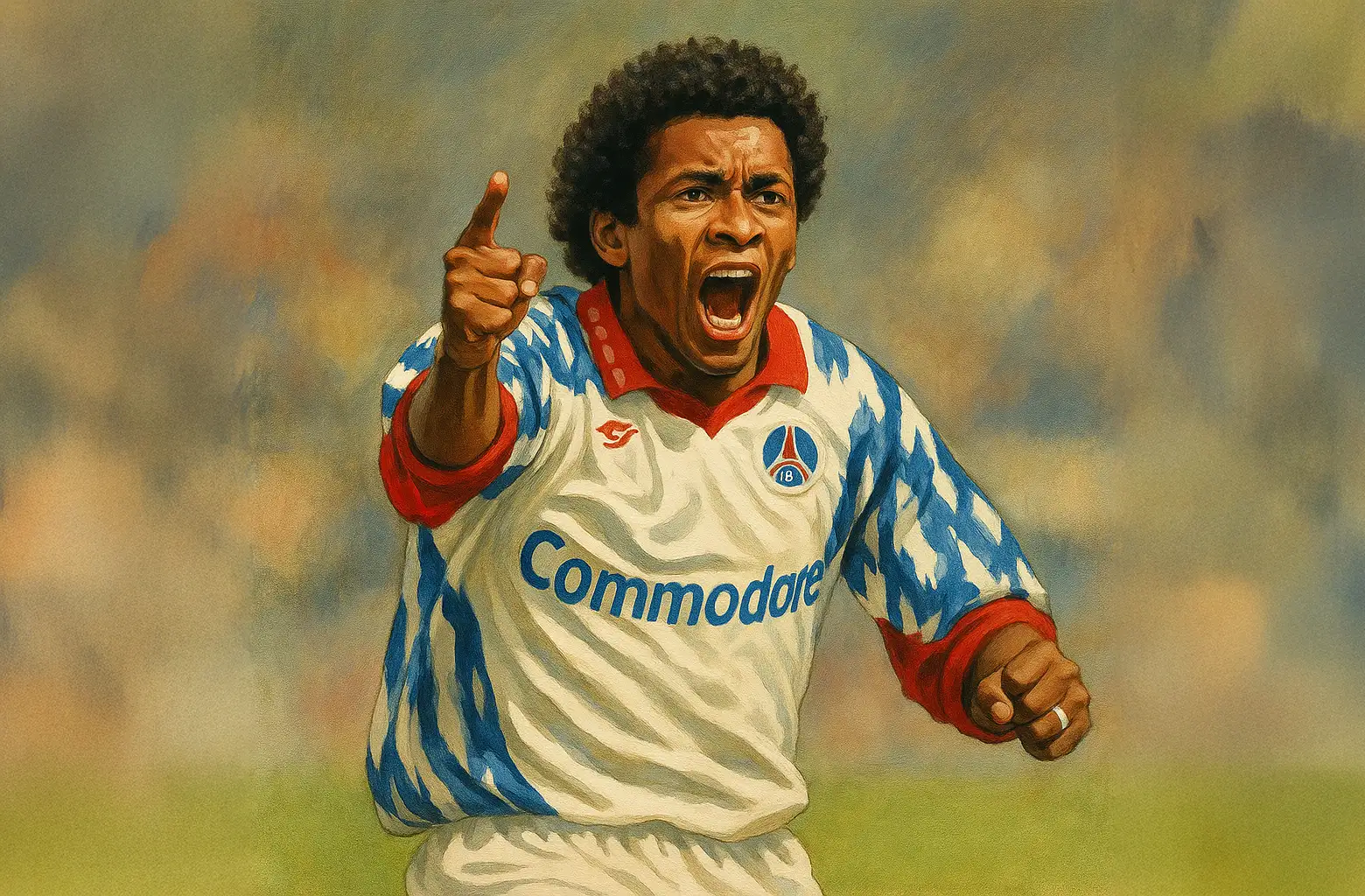
Valdo – provisory title
He dribbled like a dancer, played with a smile, and made chaos look beautiful. A rebel with the ball, and a genius no system could ever hold down.
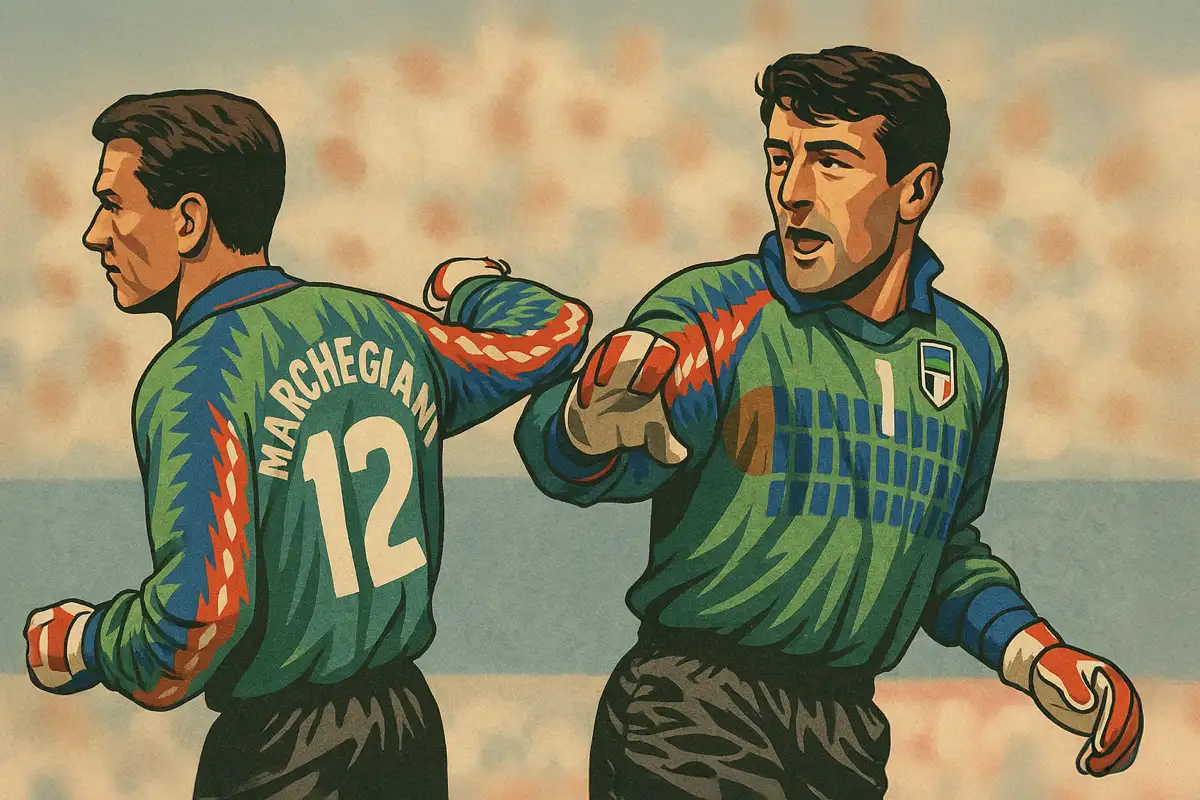
Italy’s 90’s Goalkeepers – provisory title
He dribbled like a dancer, played with a smile, and made chaos look beautiful. A rebel with the ball, and a genius no system could ever hold down.
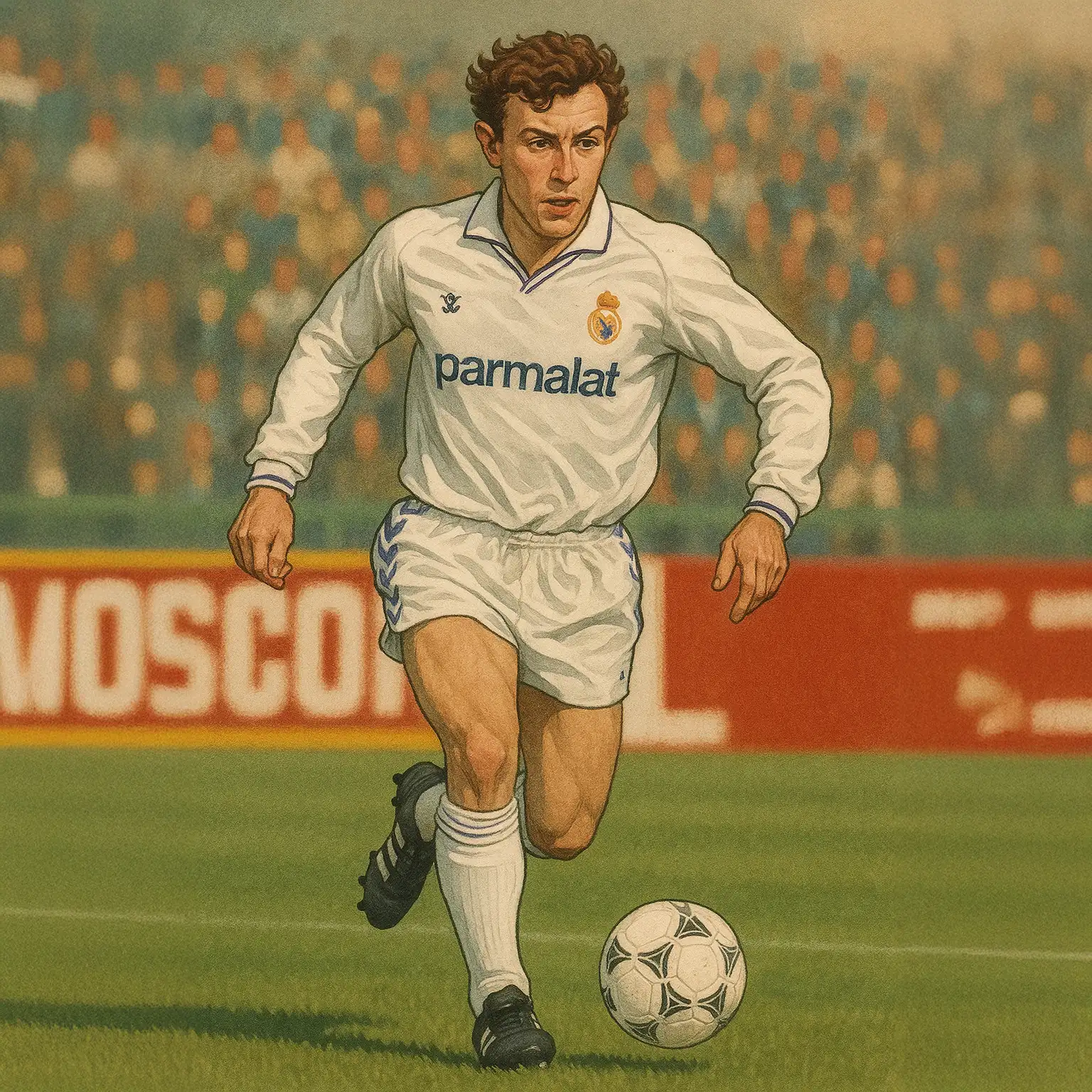
Emilio Butragueño – provisory title
He dribbled like a dancer, played with a smile, and made chaos look beautiful. A rebel with the ball, and a genius no system could ever hold down.

